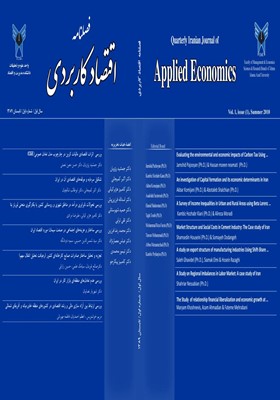بررسی رابطه بین امنیت اقتصادی و درآمدهای مالیاتی (شواهدی از کشورهای منا)
محورهای موضوعی : اقتصاد کاربردیکریم رسولی 1 , اسداله فرزینوش 2
1 - ندارد
2 - مسئول مکاتبات
کلید واژه: امنیت اقتصادی, آزادی اقتصادی, آزادی تجاری, مالیات, منا,
چکیده مقاله :
توزیع مجدد درآمد و برقراری و حفظ عدالت اجتماعی از اهداف عمدهی اقتصادی است که اکثر دولتها آن را دنبال میکنند. مالیات ابزاری است که میتواند توزیع مجدد ثروت در جامعه را عادلانه کند و از گسترش فاصلهی طبقاتی میان دهکهای مختلف درآمدی جلوگیری نماید. در همین حال از یک طرف نظام مالیاتی کارآمد میتواند از بروز مفاسد اقتصادی جلوگیری نماید و از طرف دیگر وجود امنیت اقتصادی در جامعه ای با حداقل ریسک و مفاسد اقتصادی بستر فعالیتهای اقتصادی بخش خصوصی را فراهم نموده که از این طریق موجبات افزایش درآمدهای مالیاتی دولت می شود و دولت را در انجام وظایف خود تواناتر می سازد. امنیت اقتصادی را میتوان نوعی خدمات یا کالای عمومی دانست که تولید آن از عهده فعالیتهای بخش خصوصی در بازار بر نمیآید. این شکست بازار، زمینه را برای فعالیت بخش عمومی جهت تولید مثبت مهیا میسازد. امنیت اقتصادی و مقولات مرتبط با آن می تواند بر فضای کسب و کار و درآمد ملی تاثیرگذار بوده و از این طریق درآمدهای مالیاتی را تحت تاثیر قرار دهد.بررسی تجربی رابطه بین امنیت اقتصادی و درآمدهای مالیاتی در منتخبی از کشورهای خاورمیانه و شمال آفریقا (MENA) که از نظر ساختارهای اقتصادی شباهت های نسبی دارند، انجام پذیرفته شده است. بدین منظور از روش داده های تابلوئی برای برآورد مدل استفاده شده است. با توجه به مدل برآورد شده، آزادی تجاری به عنوان اولین شاخص ثبات و امنیت اقتصادی، تاثیر مثبت و معناداری روی تحقق درآمدهای مالیاتی دارد. متغیر آزادی تجاری، به عنوان دومین شاخص نیز تاثیر مثبت و معناداری روی تحقق درآمدهای مالیاتی دارد.آزادی مالیبه عنوان سومین شاخص ثبات و امنیت اقتصادی تاثیر مثبت و معناداری روی تحقق درآمدهای مالیاتی دارد. نکته حائز اهمیت رابطه منفی بین شاخص حقوق مالکیت و درآمدهای مالیاتی است. همچنین در کشورهای منتخب رشد اقتصادی تاثیر مثبتی بر روی درآمدهای مالیاتی ندارد تورم به عنوان یکی از متغیرهای کنترلی وارد شده در مدل، تاثیر مثبت و معنی داری از نظر اماری روی تحقق درآمدها مالیاتی دارد متغیرهای کنترلی صادرات و واردات بصورت درصدی از GDP تاثیر معکوس و معنادای را روی درآمدهای مالیاتی بصورت درصدی از GDP دارند متغیر تشکیل سرمایه در اقتصاد ملی کشورهای مذکور به عنوان متغیر کنترلی تاثیر مثبت و معناداری روی تحقق درآمدهای مالیاتی دارد.
Income redistribution and establishing social justice and maintaining it are the major economic objectives that most governments are looking for them. Taxation is a tool that can redistribute wealth in society and can reduce class differences. Meanwhile, an efficient tax system could prevent the occurrence of economic corruption. Furthermore, economic security in a society with minimal risk and economic corruption can promote economic activities and lead to increase in tax revenues that help state to improve its services Economic security is a kind of public good or service that cannot be produced in the private sector in the market. This market failure leads to government intervention in providing economic security. Economic security and related issues can influence business atmosphere and national income and so can affect government tax revenues. In this paper the empirical relationship between economic security and tax revenues in the selected countries of Middle East and North Africa (MENA) which have similar relative structures, have been investigated. For this purpose, the panel data models have been used to estimate mentioned relationship. According to the results, free trade as the first indicator of economic stability and security has significant and positive effect on tax revenues in MENA countries. Trade freedom, as a second variable has a significant and positive effect on tax revenues too. Financial Freedom as third indicator of economic stability and security as former variables has significant and positive effect on tax revenues. An important to be mentioned is that the property rights and tax revenues have negative relationship in the selected countries. Also, in selected countries economic growth doesn’t have a positive effect on tax revenues. Inflation rate does have positive and meaningful effects on tax revenues in MENA: Variables as exports and imports as control variables as a percentage of GDP have negative and inverse effect on tax revenues a percentages of GDP and capital formation as the third control variable has a positive and meaningful effect on tax revenues in MENA.


